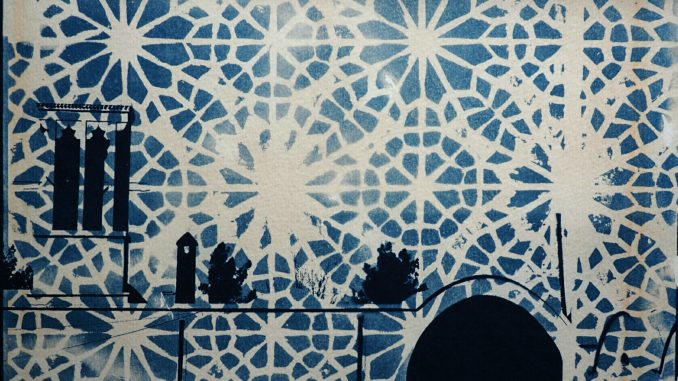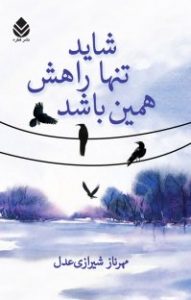
 Written by Mehrnaz Shirazi-Adl
Written by Mehrnaz Shirazi-Adl- From the short story collection That’s Perhaps the Only Way (شاید تنها راهش همین باشد) – Qatreh Publications, 2016.
- Translated from the Persian by Leili Adibfar
- Edited by Cameron Lindley Cross
- (c) Image: Yasaman Moussavi, Window, Cyanotype on paper, 11×5.8 Inch, 2013.
I told Rokhsareh-Sadat. Rokhsareh-Sadat who had come to beg forgiveness for the sake of Auntie Khatoon. I said to her, “My Agha-jan and the rest of the family, they know everything. They said so themselves. They came and they went; they decided for me without asking. Then they put me in an oversized dress that began to weep the instant it touched my body. Now that everything’s ended up the way that I myself had said it would – after I yelled and ranted to make them understand – they’ve come back to me, wringing their hands and asking, what should we do? What should we do? And they won’t give me a moment’s peace from their carping and complaining; oh, these Gogs and Magogs!”
Rokhsareh-Sadat glances out the window, asking: “What was that?” I don’t tell her that since dawn yesterday the sobs and wails of the neighbor’s wife have been ringing in my ears; her little girl seems to have melted into the ground ever since she found out that her father was going to marry her to a man twice his own age.
“Do you remember what a bratty little kid you were since those days?” says Rokhsareh-Sadat.
I remember.
I feel like it! I love to stand butt-naked in the middle of the stream and cool myself down to my soul. What do you care?!
Khatoon-Soltan comes to the edge of the veranda and lets out her piercing voice that shatters the tranquility of the neighborhood siesta, “Oh my God! Afsar-jan! The little brat is stark naked in the middle of the courtyard again, splashing water on herself!”
I used to hold the hose over my head and let every drip of the water, large and small, slide drop by drop down my burning body. I’d let out a scream and burst into laughter. Khatoon-Soltan would step into the courtyard. She’d run after me, and I’d run away still clutching the hose in my hand. I’d get her soaked and flee into the alley. I, the daughter of Hajj Seyyed Sadegh, whose father, father’s father, grand and great grandfathers were all men of the turban, minbar, and mosque, would run bare-assed into the neighborhood and my old aunt, too flustered to cover her head, charging behind.
I laugh, I run, and I fly like the wind. The alleyway pavement is hot; it burns my feet. A flood of water gushes down into the street behind me. I run from the alleys into the back alleys, and the tall wave of water runs after me. Khatoon-Soltan glides on the water as though she’s riding the waves. Behind her is my mother, riding atop an even higher wave. The wave that carries my mother rises up, lifts Auntie Khatoon and sets her upon the roof of the home of Rokhsareh-Sadat, who sits there cracking seeds with her teeth. Then they both, from that great height, dive into the water. When Agha-jan, sangak bread in hand, steps into the path, a wave lifts him up and seats him beside mother. Hassan and Akbar and Sa’eed and little Fati, still at mother’s breast, run around mother and Agha-jan in circles, laughing and splashing the water. Akbar sprinkles a handful of water over Agha’s face. Water drops trickle down his long black beard onto his cloak; he smiles. Then, the neighbors too, one after another, they each catch a wave from the tops of their roofs and windows. Everything is perfect! Everyone is happy! When water has completely covered everything and swept all the alleyways clean, I too jump on top of a great wave. I throw out my hand and hold on to the long mane of the wave with all my might.
A sudden pain shot through the back of my head, as though a thousand needles had been driven in at once. Khatoon-Soltan threw out a hand and yanked me off the back of the wave. She dragged me into the courtyard. Agha-jan, sangak bread in hand, was standing in the middle of the courtyard. Mother thrust Fati into Akbar’s arms and came running down the veranda steps, clutching her chador in her hand. My arms began to burn and grew hot, here and there, anywhere her hand could reach. With her other hand, she enveloped my naked body in the folds of chador. Then she pushed me towards the cellar wishing me every unfortunate end. My height could still not reach the round brick holes near the cellar ceiling that looked out upon the courtyard. I could only hear Auntie Khatoon striking her chest, cursing me from the bottom of her heart.
The wind lashed the water of the pool, and the sound of it turned in my ears.
I fidgeted around in my seat. Why was Agha-jan taking so long? Ahmad’s palms were wet with sweat as he took my hand, cold sweat. Everyone cheered loudly. His mother whispered into his ear to take off the bride’s veil. Ahmad had beautiful hazel eyes, though. There was something in the depth of his gaze that he wouldn’t let me read. As he was removing the veil, he turned his eyes away from me. Fati was standing by my side, holding the hem of my dress. I was leaving home that night, and I didn’t know what she would do without me. Agha-jan read our wedding contract himself. Someone else registered it officially though. As he went out the room, Agha put a hand to his beard. A tear could have fallen. Or maybe it was all my imagination, for I had never wanted to leave. When I were gone, they would all still have each other. Khatoon-Soltan was murmuring to Rokhsareh-Sadat in the corner of the room. What they were talking about and behind whose unfortunate back they were gossiping, I didn’t know. The two of them were old anyway. They understood each other well. After mother’s death, for a number of years now, Auntie Khatoon had had maternal domination over us. She said so herself. We never saw anything motherly from her though.
I turned to look into Ahmad’s eyes. They said he wove silk in Isfahan. Now it seemed I had nobody but him. Isfahan wasn’t that far away, after all. I’d be able to visit Agha-jan and the kids every few months. Who knew, maybe we could see each other more often if Ahmad was kind. Would he be kind? I turned back to look at him. I couldn’t. He got up from my side and went into the men’s section. Only the cold sweat of his palms remained in my hands.
From far away, the sound of someone laughing pours into my ears.
I stare at the lace curtains, impregnated beneath the afternoon sun. Their bellies fill and empty, and the shadow of tall and leafy trees of the courtyard fly over them. The cool breeze swirls inside the sleeping porch. I take a look at Ahmad. He’s put a scarf over his hair so as not to disturb his curls and has crumpled beside me on the mattress with closed eyes. I close my eyes and open them. The sound of the water in the stream cools me. I close my eyes again to see Ahmad opening his eyes. Now I can read the depth of his hazel eyes. He’s saying I want you so much, it seems. The whites of his eyes are crimson red. The delicate veins are full of blood. In this cool air sweat boils from both our heads and faces. Ahmad touches my body with his burning hand. He cups my breast and slowly slides over me with his masculine body. I open my eyes and stare at the ceiling. Ahmad’s snore swirls in my ears, and the sound of someone laughing from far away pours in them.
Fati said that the room was full of guests from end to end. “Don’t be sad,” I said, “I’m not leaving that soon.” Poor Fati, all in a tizzy, rushed down the cellar stairs two at a time and said, “Sis, Auntie Khatoon wants you to come and bring tea for them.” I laughed and said, “My little sister, I’m not the type to rush off and get married. Let the living room get full and empty. I’ve still got trick or two up my sleeve to fool them with.” I opened the jar of pickled garlic. I picked out a couple of the large ones and peeled them and tossed them into my mouth and kept chewing them as if they were bubblegum. I looked back. Poor Fati stared at me open-mouthed, wondering what I was up to. I grinned and went on to the gunnysack of charcoal dust. I dipped a finger in and then rubbed my blackened finger over my upper and lower teeth. Khatoon-Soltan had opened the window and was calling Fati. Fati was nervous and unsure of what she should do. I said, “Sis, go tell them I’m coming.” She smiled and ran out of the cellar. Then I put on my chador inside-out and followed her. Inside the room I did all I could to exchange smiles with the guests. Khatoon-Soltan, sitting in the corner of the room, turned as red as a beet. She kept glaring at me. When it was time for them to go, I hugged the groom’s mother forcibly, asking her to her face how were her close and distant relatives?
The huge courtyard is paved with adobe bricks. It’s become my routine now to fill the copper watering can three times a day from the round pool in the middle of the courtyard and water the yard from end to end; the trunks of the firs and sycamores, the flowerless geraniums in their flowerpots. Everything is scattered around in this house. No one talks to anyone. Sometimes I set out to go hop over every other brick and go back and forth. Some other times, on every other brick, I write down the names of the kids with a bit of charcoal, those of my sisters and brothers I mean and the relatives’ kids and neighborhood playmates, and hop over the bricks sixteen times, counting up to my age. On each brick that I land, I add up the age of the kid whose name is written on the brick to mine and start to hop again. I jump around so much that I get tired and fall out of breath. Then I sprinkle water over the bricks again and wash them so they gleam, every day, again and again. Since the year that I arrived, I’ve given the bricks so much water that they are turning green. Ahmad doesn’t see it, though. He does not even look to see. When he comes back from the shop, he goes straight to his mother’s room. He eats his dinner, spreads his bed, and goes to sleep right there.
I go to my room and can still hear the sound of someone laughing from far away until I fall asleep.
I couldn’t go back. Agha-jan had forbidden it. My heart felt as thin as a sheet of paper, I missed him so much. I missed Hassan and Akbar and the others, too. The first and last time I went back home, I put both feet into one shoe saying I would never go back to Isfahan. Ahmad was there too, with his mother. I said in front of everyone that Ahmad still slept in his mother’s room in the nights, and that his hand hadn’t yet touched my body. Agha told me to hold my tongue, and khatoon-Soltan whispered in my ear that God is with those who patiently persevere. They sent me on my way back home.
Ahmad pours the cocoons into the boiling water. With a long-necked paddle, he stirs the pot filled with boiling cocoons. The butterflies inside the cocoons are restless. Suddenly the pot fills with color. Thousands of butterflies fly out.
Rokhsareh-Sadat said that Khatoon-Soltan knew everything from the beginning. Well, not from the very beginning, but since the wedding. Even before that, it seems that she heard a thing or two from somewhere. On the day of the wedding, she pried words out of the groom’s family. One of them who apparently harbored some kind of grudge let it slip out that the groom “had never been a man” from the beginning. She has come with Sa’eed, Rokhsareh-Sadat. But he hasn’t come in. I saw him from the window though. These last couple years he’s grown into a man for himself. Rokhsareh-Sadat says the instant khatoon-Soltan learned that I had rented a nested room in the bowels of Tehran, she sent her to me to beg my forgiveness. The old woman cannot walk anymore. She’s confined to bed and spends her time whining. Fati and her husband take care of her now. I wanted to go see Fati, but she hasn’t told her daughters that they have an aunt. Their aunt would be a disgrace to them. Rokhsareh-Sadat is sitting on the blanket and the glass of tea before her has turned as cold as the water in the pool. I want to get up to go and fetch her another tea. She doesn’t let me. It’s as though she cannot take it to drink the tea brewed by a woman like me. She says nothing though; only shifts her weight from one leg to the other so that she can leave. She’s only waiting to hear one word from my mouth that I have forgiven my aunt, and then she can be gone. I don’t let her go. Not until I inquire after every one of the kids and hear their news. Everyone knew that Khatoon-Soltan had no kids, nor did she have the patience for them. For what wise purpose fate gave her at old age the burden of playing mother to her brother’s grown and half-grown orphaned children, only God knew. Rokhsareh-Sadat kept telling her this was God’s reward for all her years of patience. She had spent a lifetime sitting at Mirza’s feet and now, without saying a word, she’s the mother of a throng of kids.
Now that Ahmad’s mother is gone, I set out to come to Tehran any day; once on the bicycle of the cotton-beater who passes behind the wall of the alley; another time, on the back of the china-mender’s mule. Eventually, when the spring comes, I’ll catch the butterflies. Just when they land upon a leaf or a branch under the sunlight, I’ll creep forward, slow and silent, and grasp their soft wings with my two fingers. Not in a way that they get hurt or lose their wings. Then I’ll release them all, one by one, into one of the empty rooms. When they turn into a swarm, I’ll tie a thread to the end of each one of their tails and leave the room’s door open so they fly away, all of them together. My feet too will rise off the ground with them and I will go out forever, out of the courtyard of the house whose door is always locked, and out of the Isfahan of which I saw nothing but Ahmad’s house. I look at my fingertips and see that they are colorful, and the sound of laughter from far away turns in my ears again.
“I will not forgive,” I say. The day that I came out of Ahmad’s house with only a chador, the walls were all covered with black cloth. It was Moharram, apparently. Then why was someone laughing non-stop alley after alley? Agha-jan himself declared the contract null and void, and the butterflies kept circling above my head. Ahmad didn’t say a word and placed my bride-price of a hundred Tomans into my palm. I returned to Tehran with Agha-jan on a bus. When I arrived in Tehran, I followed the trail of butterflies and lost my Agha-jan. I set out to go home. I didn’t want to. I reached into my blouse and pulled out the hundred Tomans. I went and spent every last one on silkworms. While they spun their cocoons, I stood over them like a mother until they turned into butterflies.
When I walk out Rokhsareh-Sadat and come back to the room, a butterfly spreads its wings and comes through the door into the room. It sits upon the closet’s curtain. I leave the door open; perhaps when all the noise dies down, the little girl, the neighbor’s daughter, will want to leave the closet of my room as she feels like it, fly away and go after her life. I’ll take her hand, wherever she wants to go, whatever she wants to do.


Leave a Reply